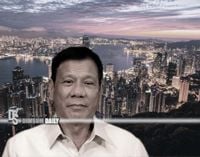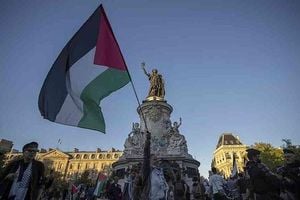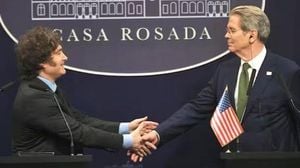MANILA, Philippines — In an extraordinary statement that has captured national attention, Senator Ronald "Bato" dela Rosa has voiced his steadfast refusal to surrender to the International Criminal Court (ICC). During an interview on March 22, 2025, he asserted that an arrest warrant from the ICC holds no weight, as the Philippines does not recognize the court's jurisdiction. "Hypothetically speaking? No, I will not let them catch me. I will not surrender. I will not let them catch me," the senator emphatically reiterated, insisting that he would only comply with legal demands from Philippine courts.
Dela Rosa, who previously served as the national police chief under former President Rodrigo Duterte, is associated with the controversial anti-drug campaign that resulted in thousands of deaths. He was the architect behind Command Memorandum Circular No. 16-2016, which laid the groundwork for Duterte’s aggressive drug suppression strategies. Under Duterte's administration, estimates of those killed in the drug war range from 6,000 to potentially 20,000, according to various reports from human rights groups.
"If the warrant came from the Supreme Court or it came from one of our Regional Trial Courts then I will face it. But if it came from an entity that we don’t recognize, then why will I face it?" Dela Rosa declared. His remarks have sparked discussions about the sovereignty of the Philippines in international law, particularly in light of the ICC's ongoing investigations into alleged crimes against humanity associated with the drug war.
Meanwhile, the legal troubles do not stop with dela Rosa. Former President Rodrigo Duterte himself is currently facing charges from the ICC following the issuance of a warrant against him on March 11, 2025, for crimes against humanity linked to the drug war. Just days after the warrant was issued, Duterte attempted to seek asylum in China after attending an event in Hong Kong on March 7, but was denied entry. In a twist of fate, upon his return to Manila on March 11, Duterte was taken into custody and swiftly transported to the ICC in The Hague.
Philippine police had been preparing for his arrest since January, and upon his return, law enforcement officials were on high alert. According to PNP chief Rommel Marbil, the Criminal Investigation and Detection Group (CIDG) was instructed to ensure Duterte's prompt arrest following the release of the warrant. Initially, officers had aimed to apprehend him while he was still in Hong Kong, where police cooperation was expected. However, the Hong Kong Police Force ultimately declined to assist, which forced Philippine authorities to reroute their plans.
Notably, Duterte spent only about twelve hours in the Philippines after his return before boarding a chartered flight back to The Hague to face the charges against him. Vice President Sara Duterte, reflecting on her father's situation, stated that he has left his fate in God's hands. "He said, 'I am entrusting everything to God. Whatever happens to my life, so be it,'" she shared during her visit to see him. This statement reveals a blend of familial loyalty and resignation to the unfolding legal drama.
The current appeal of Duterte's legal representatives adds another layer to the complexity of this situation. Defense counsel Nicholas Kaufman has praised Duterte’s prosecutorial insight during a recent interview, indicating that he possesses a profound understanding of legal procedures. "He was an extremely good prosecutor," Kaufman noted, hinting at the intelligence and strategy Duterte may deploy in his defense.
Families of the former president are also rallying support during this challenging time. Vice President Sara Duterte mentioned plans for family members to gather in The Hague on March 23, 2025, to show solidarity during this tumultuous period. She is hopeful that her mother, Elizabeth Zimmerman, and siblings, Paolo and Sebastian, will attend, although the exact timing of their arrivals remains uncertain.
As the situation continues to unfold, the stakes remain high for both Dela Rosa and Duterte. The looming possibility of arrest warrants and the question of accountability for the violent anti-drug campaigns hang heavily over Philippine politics. In a region where questions of sovereignty and international law are increasingly discussed, the outcomes of these legal challenges could have far-reaching implications not just for the individuals involved but for the country's relations with international bodies like the ICC.
In closing, the resistance from figures like Senator dela Rosa encapsulates the broader reluctance among some Philippine authorities to engage with the ICC, reflecting a complex intersection of nationalism, law, and morality in contemporary Philippine governance.






